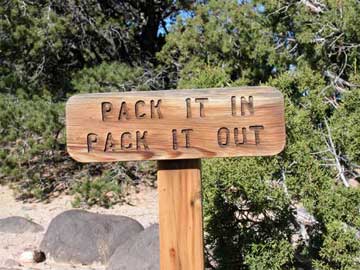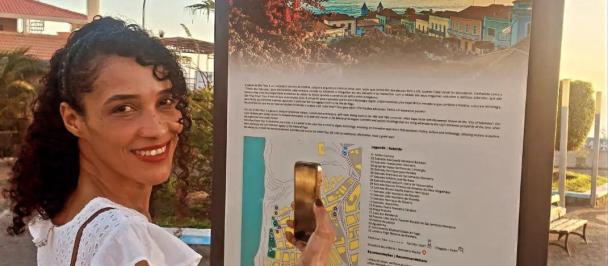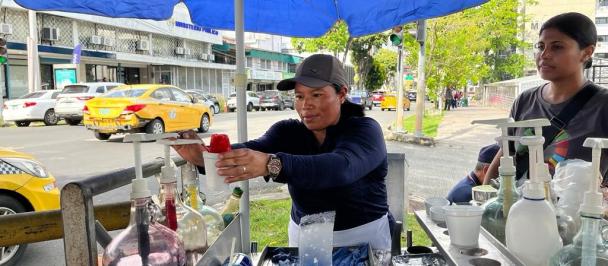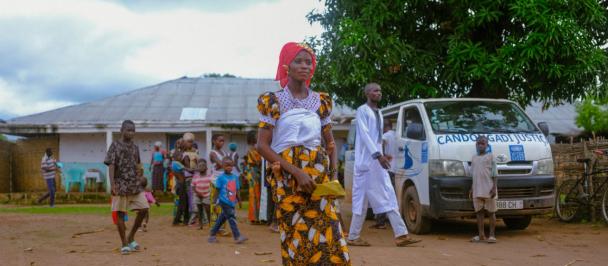Too Small to Fail – Lessons from Small Businesses on Recycling in Tonosi
Too Small to Fail – Lessons from Small Businesses on Recycling in Tonosi
October 19, 2021
On a recent visit to Zion National Park in the western part of the United States, I encountered a sign at the start of a trail head: ‘PACK IT IN PACK, IT OUT.’ A self-described adventurer and nature lover who is always up for a good hike, I’ve always respected this concept. Whatever you bring with you on a trail should also be taken out. It goes beyond proper etiquette and common sense; it’s a principle that allows visitors to enjoy nature in a sustainable way by avoiding human-created impact.
A few years ago, I just so happened to be following a group of hikers who were littering throughout a 10km trail. I felt like I was in the fairytale Little Red Riding Hood, their trash left a trail of clues as to where they were heading. The wolf would have surely found us. Had we been hiking in another geographical region, bears may have found us, too. I quietly collected the trash they kept tossing along the trail and when we got to the end kindly handed it back to them. “I think you dropped this,” I said. “Pack it in, pack it out,” I thought. Perhaps it wasn’t common sense after all.
I was reminded of this encounter recently while interviewing a business owner about recycling practices in Guánico, a small community in one of Panama’s more remote municipalities. Trash was piled high outside of his kiosk, spilling onto the muddy ground below. He seemed frustrated. “I’ve asked the bottling company before,” he said. “Why can’t they just take back all the trash they bring into our communities?” His question was indeed relevant – ‘pack it in, pack it out,’ I thought. But, after noticing that the bulk of his trash was plastic soda bottles, I didn’t want to let him off the hook so easily, especially knowing that those very same plastic bottles were available in returnable glass by the bottling company. “Have you ever considered switching from plastic to glass?” I asked. Although it was a cordial and jovial conversation, he was visibly disturbed by my question, raising his tone. “I’ve got to eat,” he quipped. “People would stop buying.” “Plus,” he said, “I’m too small of a business to make a difference.”
Too small to make a difference. His words resonated with me, not because they were surprising but because I’d heard them before. We had recently spoken to the very same bottling company offering sodas in returnable glass about a recycling program. “The volume just isn’t there,” they said. “Tonosi is just too small.” (More on that in an upcoming blog). Still, it begs the question, where does the responsibility lie? Who is responsible for packing it out?
A recent article in the New York Times sheds light on our inquiry, highlighting a new law in the state of Maine that would require manufacturers, rather than taxpayers, to cover the costs of recycling. Part of the impetus? When China stopped buying recyclables, many cities across the United States did away with their recycling programs altogether or downsized significantly. They didn’t know what to do with the accumulated material. This ripple effect was also felt in Panama, with many programs scrambling to figure out what to do with an excess of recyclables. With no one to buy, companies were unable to stay afloat.
I had never thought so deeply about the shared responsibility of waste collection and recyclables, but after spending weeks in a municipality like Tonosí, where less than 50% of residents can count on a reliable waste collection service, it’s hard not to think twice about where you dispose of your waste.
In preparation for a pilot project exploring sustainable recycling practices in Tonosi, the UNDP Panama Accelerator Lab shares its findings from interviews with 25 small business owners about how they manage waste.
Most business owners have visited the municipal landfill
“The municipality used to come, then they stopped” is how most residents start explaining the problem of waste in Tonosi (residents who made these comments presided in the counties of Cambutal, Guánico Abajo and Búcaro). When asked how residents dispose of waste, over 40% answered that they take their own trash to the municipal landfill – a mismanaged and largely unregulated dump with both solid and hazardous waste. Residents travel an average distance of 15 miles one way to get there.
Businesses don’t trust the government to handle waste
Despite being required by law, the only place the municipal government provides waste collection services is in the center of Tonosi – one of nine counties. In other words, 90% of counties don’t receive waste collection services from the municipality. Which is why we found it odd that, when asked if they receive waste collection services, 67% of business owners responded ‘yes.’ This did not coincide with what the municipal government had shared. It turns out that, business owners had grown tired of the municipality’s inconsistency and took matters into their own hands: “I don’t expect that the municipality would pick it [trash] up,” said one business owner. “I don’ trust them and don’t pay any attention to anything they do.” Businesses weren’t receiving waste collection services from the municipality, rather, they hired a private service to do so.
People want to recycle
“A pessimist sees the difficulty in every opportunity; an optimist sees the opportunity in every difficulty.” When business owners were asked if they recycled, 100% responded ‘no.’ While this might sound discouraging, the Lab prefers to take the approach of Winston Churchill. Learning that no one recycles isn’t easy to hear; however, it provides a tremendous opportunity to implement a recycling pilot program, especially given that 89% of business owners are interested. A business owner in Cambutal shared this same optimism: “Given the amount of growth in the community, it’s a good thing to start early, with momentum.”
Most of the waste heading to the landfill is recyclable
Most businesses in Tonosi are hotels and supermarkets. When surveyed, plastic was the most reported waste item, followed by cardboard, aluminum, paper, and organic waste. While supermarket owners appeared skeptical about a recycling program, hotels were eager, especially in high-tourist counties. “We throw away so much plastic because tourists don’t want to drink the water,” according to one hotel owner who described a group that had just checked out: “They left a dozen gallon jugs of plastic water bottles from a week-long stay.” Hotel owners also mentioned that tourists often travel from countries with strict recycling laws and are often discouraged to learn hotels do not recycle
Putting a price on trash is difficult
While 67% of businesses surveyed pay for waste collection, the prices they pay are inconsistent, ranging anywhere from $0.50 to $15. “I’m not really sure how much I pay,” said one business owner, an answer that represented 8% of responses. 25% of respondents reported not paying at all. Business owners receiving waste collection services from the municipality were the most uncertain about how they paid, usually answering “I think it’s added to taxes.” As for the amount, most responded, “I think it’s $2 a month.” Kiosks and small restaurants typically reported paying $1 per bag to a private service, while larger hotels reported paying by the truckload, usually $15 per trip.
The challenge of solid waste management (SWM) is multifaceted and complex; we know. As the UNDP Panama Accelerator Lab continues its exploration into learning what solutions have the potential to accelerate development in SWM, we are inspired by those individuals who don’t think they are too small to make a difference. “We want to make Tonosi a clean district which can help boost sustainable tourism and help reactivate the economy,” said the Deputy Mayor of Tonosi. “We’re really excited about the potential of this pilot project.” As a Lab, we hope to help Tonosi work towards their own sustainable version of ‘pack it in, pack it out.’ Stay tuned.
###
Stay tuned for updates and if you have ideas, do not hesitate to contact us at laboratorioaceleration.pa@undp.org
Lea este blog en español aquí

 Locations
Locations



